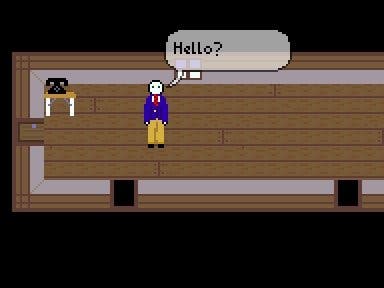The Luddite Game Maker
Jason Rohrer on life, death, video games and diamonds.
Middle Age
Rohrer is currently finishing a commercial release (and his ninth game) Diamond Trust of London which is due for release on the Nintendo DS this autumn. A two-player, turn-based strategy game with spying, bribing, and deception mechanics the game takes place in Angola in the months leading up to the passage of the UN's Kimberley Process for diamond certification in the year 2000.
"The reason I'm making a game for the Nintendo DS involves a bit of a long story. I was approached by Majesco, back at GDC 2009 and asked if I'd be interested in making a DS game. I pitched a few ideas to them before they green-lit."
"I worked on the game for about five months, completing several milestones and bringing the game to a gameplay-complete state (still missing tutorial and music). At that point, maybe because the market had changed, Majesco started suggesting a DSiWare release instead of a cartridge.
"I looked into it and determined that DSiWare was retail suicide (even my existing fans couldn't get the game unless they bought a DSi, whereas almost everyone has a DS lying around), so I dug my heels into the sand and stopped working on the game. We never came to an agreement about how to proceed, so we ended our contract. The game then sat there for almost a whole year before Zoo Games heard about it and picked it back up. Zoo has been awesome so far, and they're really going to make cartridges. The first edition will be limited, signed and numbered."

Rohrer and his family are due to move to Davis, CA in a few months, in part thanks to it being "the most bicycle-friendly small city in the US." This new environment will affect Rohrer's short-term work plans. "In order to afford the cost of living there, I've got a lot of hard work ahead of me. I plan to keep releasing and selling my own games for a while. But I could also see myself heading a larger team someday."
With working alongside a larger team part of the long term plan for Rohrer, I ask him whether he has happened upon any jewels while working as a solo game maker that could benefit mainstream studio developers.
"I used to hope so, but the more I've been exposed to the mainstream development process, the less hopeful I am. It seems like they are all hamstrung by severe limitations that prevent them from exploring anything but a narrow channel in the design space. I've got a friend who is working as a writer and concept guy for a forthcoming FPS, and he's been coming up with lots of great ideas about how to make the gameplay more meaningful, but a lot of his best ideas can't be done because the game engine simply can't support them. And most mainstream devs are using some off-the-shelf game engine, which means that their designs must fit into what their engines were meant to support."
The End?
It's not only for this reason that Rohrer rarely plays video games these days. "I've got three little kids to take care of, and I'm devoting the rest of my time to making games. Most of the people I know in the game industry are either single or childless, which gives them plenty of time to play games when they come home from work. Playing video games takes up a ton of time, which is one of the many reasons why most normal people don't engage with them."
There's a certain type of irony in the fact that a man who made his name with a game exploring the passage of time and its effect on a human should see his vocation as, by necessity, a temporary one. "I feel like programming is a young person's game - hard on your body, and demanding on your mind," he says. "I don't necessarily imagine making games forever, though I've certainly kept at it longer than I've kept at any one thing in the past. Then again, as I've gotten older, my attention span has gotten longer, so you never know."








